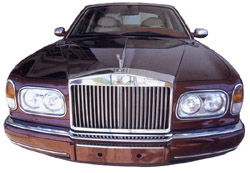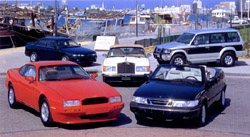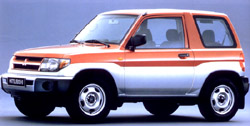Motoring Ahead
Car manufacturers in the United States, Europe and Japan are looking
more and more towards the Middle East and Gulf states as a market for
their products. By Barry Jordan
 At the 1999 North American International Auto Show in Detroit, several
manufacturers admitted that while sales in other parts of the world were
adequate, the Gulf region held out the best prospects, particularly for
top-of-the-range models.
At the 1999 North American International Auto Show in Detroit, several
manufacturers admitted that while sales in other parts of the world were
adequate, the Gulf region held out the best prospects, particularly for
top-of-the-range models.
This part of the world is home to a population with a very high average
disposable income. One recent economic survey suggests that with a
population of just 2.5 million and the 19th largest GDP in the world,
annual income per person in the UAE is in the region of $20,000 per
person. Looking at some of the prestige new cars available here, it
seems that many car manufacturers have read the same survey! Add to that
the growth of the population and the young average age,and for a number
of car-makers, this small market buys more 'up-market' models than areas
such as the Far East and South America.
A prime example is the sales of probably the most prestigious vehicle in
the world, Rolls Royce. For the third time in recent years, the Rolls
Royce Division of Habtoor Motors has been voted the number one Rolls
Royce dealer in the Middle East.
This doesn't mean that it's easy to sell a Rolls Royce in the UAE. The
latest model, for example, the Silver Seraph, costs in excess of one
million dirhams. Habtoor Motors soon realised that customers are not
going to line up at their showrooms to buy one. Instead, the division
has mounted an effective campaign to woo customers by going to them!
They discover what exactly the customer wants from a car. How long the
car will be owned. For some, it's as little as three years. For others a
lifetime. Customer care therefore becomes essential.
Customer care obviously involves the servicing of the car, so efficiency
targets concerning the quality of mechanical servicing, availability of
spares and speed of maintenance are of prime importance. In 1998, the
Service Division of Habtoor Motors achieved its access targets for
labour and parts, and has been voted number one service agency for Rolls
Royce in the Middle East for the second successive year. It also won
second and third prize in the coveted Rolls Royce Mechanical Award.
Because of its reputation for quality, Habtoor Motors is now
establishing an in-house MVQ training course for its employees and is
determined to gain more prizes for achievement and excellence for
servicing and sales of Rolls Royce vehicles in the region.
The company also won an award for sales, the most sales of Rolls Royce
throughout the Middle East in 1998. Sales figures are often difficult to
quantify. One executive from the home of Rolls Royce, Crewe in the
British Midlands, said recently that on average, about 40 vehicles are
sold every year in the Middle East. That doesn't sound a large total,
but when those combined sales amount to nearly $11 million, one can see
the importance of the market to Rolls Royce.
Car manufacturers in general have had to assess the prospects for
various world markets in the light of current economic difficulties.
Assessment of the Middle East market is no exception. Although this
region has largely escaped the economic recession in the Far East,
Russia and some South American countries, other factors have to be taken
into consideration. In particular, the fall in the price of oil, and the
value of the Japanese yen against the US dollar.
The fall of the yen against the dollar has pleased Japanese
manufacturers and given their products a price advantage over American
and European models. But it has also made producers in Britain, Germany,
France and the United States look to their laurels and bring out
vehicles that, in many cases, out-perform Japanese cars and with a style
which is more appealing to many buyers in the region. Falling oil
prices should, in theory, mean less revenue for governments and
individuals alike, leading to a decline in the sale of new vehicles, but
in practice this has not been the case. A number of manufacturers have
increased sales substantially within the region during the past twelve
months and say they expect growth to continue in 1999.
The German manufacturer BMW is a prime example. It's regional sales went
up by 18.2% last year, giving the company a turnover of DM450 million
(Dhs 990 million) compared to DM410 million (Dhs 902 million) in 1997.
Of the three major models sold in the Middle East, the 5-series saloon
showed a 9.5% increase over the previous year, while the larger 7-series
car accounted for approximately one third of total sales. The importance
of the Middle East market can be measured when comparing regional to
global vehicle sales. According to provisional figures, BMW increased
sales globally by 4%, considerably less than
the 18.2% recorded in the Middle East.
According to Robert Bailey-McEwan, BMW's regional managing director, the
company expects better results in 1999, with the 7-series leading the
way, and assembly of the 3-series in Egypt starting this month.
When measuring these figures, the amount of investment made in the
region has to be taken into account. At the end of 1998, the value of
BMW importers' investment programme exceeded DM200 million (Dhs 440
million).
Chrysler is one of the biggest vehicle manufacturers in the United
States and, since its merger with Germany's Daimler, one of the largest
in the world. Although since January 1st the company should be called
DaimlerChrysler, Middle East figures for 1998 are for Chrysler only.
Their sales bear no comparison to BMW. In fact total sales in the region
were down by about 30% in the major Gulf markets of Saudi Arabia, Kuwait
and the UAE.
The fall has been blamed on lower oil prices and a weakening Japanese
yen, as well as what Chrysler describes as 'a year of product transition
as the previous line of large cars was phased out in anticipation of the
new generation of Chrysler products.'
Some balance was established with a 30% increase in sales in Lebanon and
rather surprisingly, in Egypt, where despite the imposition of a 200%
import tax, sales increased by 5%.
For 1999, Chrysler has a more positive outlook and a new breed of
vehicle to offer. The sporty 300M was launched in the UAE late last year
and after only two months, 200 cars had been sold. A new Jeep Grand
Cherokee and the Dodge Durango have evoked considerable interest. The
Chrysler Concorde, a family sized car will be available in the region in
March, to be followed shortly afterwards by the smaller, new Neon
saloon. Even though the price of oil is still depressed and the
value of the yen remains low, Chrysler expect to sell close to 14,000
vehicles in the region by the end of the year.
 Japanese car-makers are in a different position to European and American
manufacturers. They should all be smiling, since the fall in the value
of their currency against the dollar means they're selling more cars
overseas. In the UAE, for example, Nissan says all of its '99 models
will be cheaper than the previous year. According to Masashi Nakaura,
Nissan's Middle East general manager, "Overall by about 8%. The actual
figure is between 6% and 15%, depending on which model." He also
emphasised the popularity of Nissan's cars in the region saying, "Since
1994 our sales have doubled and overall market share increased from 10%
in 1994 to 17% in 1997."
Japanese car-makers are in a different position to European and American
manufacturers. They should all be smiling, since the fall in the value
of their currency against the dollar means they're selling more cars
overseas. In the UAE, for example, Nissan says all of its '99 models
will be cheaper than the previous year. According to Masashi Nakaura,
Nissan's Middle East general manager, "Overall by about 8%. The actual
figure is between 6% and 15%, depending on which model." He also
emphasised the popularity of Nissan's cars in the region saying, "Since
1994 our sales have doubled and overall market share increased from 10%
in 1994 to 17% in 1997."
Other Japanese exporters to the Gulf can report similar, positive
results. But economic problems in Japan have resulted in a big slowdown
in production as well as increased manufacturing costs, while continuing
uncertainty about the value of the yen, is affecting the entire Japanese
car industry.
One senior executive with a Japanese car-maker said in Detroit that a
recent confidential meeting between several Japanese manufacturers
predicted that sales of Japanese vehicles worldwide would decline by a
least 10% in 1999, and was likely to remain at that level for the next
five years. Because the worldwide car industry is so vast, one would
expect some radical ideas for the future, and 1999 seems to be the year
for the best and most unexpected yet.
Last year saw the battle for Rolls Royce being won by both BMW and
Volkswagen, and January the 1st was the date of the official merger
between Chrysler and Daimler. Ford is the latest car-giant to be
involved in a merger with an overseas company.
At Detroit, all the talk was of Ford and Honda forging a merger
partnership. Initially, low-level executives from both companies
dismissed the idea, but later in the week neither company had
specifically denied that talks were going ahead.
Later it emerged that Ford was bidding for a share in the Swedish
car-maker Volvo. One rival executive with another American manufacturer
said in Detroit that Ford had been taken aback by the speed of the
Daimler/Chrysler merger, and believed that merging with a foreign
manufacturer had to be a Ford priority.
Nissan has said it will seriously consider an offer by the French
company Renault, to buy a percentage of its shares, but denied the offer
had been for 20%.
This follows an earlier report that Nissan was holding talks with
Renault, DaimlerChrysler and Ford to form an alliance to develop future
models. Chrysler is now in 'substantive' talks with Nissan over the
possibility of buying the Japanese company's loss-making trucks
division.
There have been some radical new car designs and versions too, many of
them on the way to the Middle East later in the year. For many car
companies, 'sport' seems to be the most popular word at the moment.
There are new sport cars, sport 4x4's and sports utility vehicles.
Heading for the Gulf or already here are the Mercedes SLK, BMW Z3, (and
BMW's X5, a 'sports utility'), Porsche 911, Peugeot 406, Chrysler 300M
and the Jaguar XK180.
Another vehicle that sells well in the Gulf is the ubiquitous RV or
Recreational Vehicle. About the size of a small delivery van, these
vehicles offer the best in luxury and can seat 9 or10 people. A number
of manufacturers are selling increasing numbers throughout the Gulf
region.
 The other vehicle, which manufacturers consider to be in great demand
here, is the 4x4 off-road wagon. Most Japanese 4x4's, like the
Mitusbishi Pajero, sell well in all six GCC states. American versions
are also popular, along with the British Range Rover and Discovery.
Since its takeover by BMW, Rover has been going through some tough
times, including shutting down part of its production, strikes and staff
redundancies. It's pinning a lot of its hopes on the new Land Rover
Freelander and Discovery. The Freelander was voted European Car of the
Year in 1998 and has performed remarkably well throughout Europe. The
1999 Discovery has benefited from its tie up with BMW, and is fitted
with around 200 new technical innovations.
The other vehicle, which manufacturers consider to be in great demand
here, is the 4x4 off-road wagon. Most Japanese 4x4's, like the
Mitusbishi Pajero, sell well in all six GCC states. American versions
are also popular, along with the British Range Rover and Discovery.
Since its takeover by BMW, Rover has been going through some tough
times, including shutting down part of its production, strikes and staff
redundancies. It's pinning a lot of its hopes on the new Land Rover
Freelander and Discovery. The Freelander was voted European Car of the
Year in 1998 and has performed remarkably well throughout Europe. The
1999 Discovery has benefited from its tie up with BMW, and is fitted
with around 200 new technical innovations.
The Discovery will go on sale in the region in the first half of the
year and the Freelander early in 2000. Both vehicles are likely to make
a big impact on the four wheel drive market.
Aside from political problems in the northern Gulf or a devastating,
further fall in the price of oil, all of the world's vehicle
manufacturers will continue to look to the Gulf as a small but lucrative
market for their products.
Looking at the wide range of new vehicles at the North American
International Auto Show and the number of companies intending to sell
these models in the Middle East, motorists will be hard pressed to
decide which model to buy.
But I like the comment from a long-time Gulf resident, who said,
"There's really no choice. The best car in the world is a Rolls Royce,
and if you can't afford one now, work hard and save until you can."